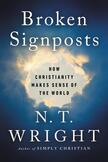Life can be painful, but it is not without hope.
The concept behind Broken Signposts is both simple and challenging, old and new. In the most recent of his many books, the Anglican theologian and biblical scholar N. T. Wright—formerly bishop of Durham, now a professor of New Testament and early Christianity at the University of St. Andrews—takes us through seven universally preoccupying themes: justice, love, spirituality, beauty, freedom, truth and power.
His premise is that each of these themes is a kind of signpost directing us toward some fundamentally important truth—the kind that philosophers, writers and artists all try to decode. But their attempts are necessarily flawed, because the only way to real understanding is the revelation of God in Jesus Christ. Unless we ground our thinking in that one perfect and universal source of knowledge, the signposts of our world cannot do more than point us vaguely along the right path. On their own, they are broken.
Wright’s formulation of this problem is his own, and those familiar with his work will recognize it from his History and Eschatology, which was based on his Gifford Lectures from 2018. But the interaction between the claims of philosophy and those of religion—the question of where thinking should end and faith begin—has troubled Christianity from the beginning. Every historically aware reader will be reminded of someone: Paul, inveighing against the eloquent “super-apostles” of 2 Cor 11; Augustine, in constant creative tension with his own pagan philosophical training; Savonarola, expounding on Scripture in deliberately plain language as an assault on Florentine aristocratic humanism. In this sense, Broken Signposts is an original approach to a very old question.
The interaction between the claims of philosophy and those of religion has troubled Christianity from the beginning.
Part of that originality is Wright’s choice to base his exposition on the Gospel of John. He gives us a detailed and knowledgeable account of the Gospel, and his idiomatic translations—drawn from Wright’s own version of the New Testament (The Kingdom New Testament)—also bring freshness and accessibility to what could easily be a complicated and rather dry undertaking. It takes an exceptional communicator to make close exegesis of Scripture quite this readable. And Wright is an exceptional communicator. The narrative he presents is compelling and tightly bound: John emerges as the sophisticated work of a disciple-evangelist whose overwhelming desire is to bring us into contact with Jesus and his message. We can hear and understand the entirety of this message by considering John with the correct attention.
In this reading, everything follows in sequence. The prophecies of the Hebrew Bible pointed to Jesus, and he came and fulfilled them; the fundamental doctrines of Christianity, like the Trinity, flow out from the time of his coming. It is a category error, Wright tells us, to think that there is no Trinitarianism in the New Testament simply because “the word ‘Trinity’ and the technical terms associated with it” came later. “In fact, the reality that those later words were struggling to express is woven deep and tight into the very fabric of the earliest Christian life, thought and prayer.” If we understand the love at the heart of the story—“the rich, many-sided mutual delight you find in healthy families and wider communities”—then we understand what the idea of the Trinity is about, terminology be damned.
Wright’s argument is deeply informed, and even those who disagree with his approach will find it a serious one. And yet the insistent completeness of his analysis—in which little or nothing in Scripture appears unresolved, ambiguous, historically contingent or simply unimportant—throws up a few loose ends of its own. What happens, for example, when the reader of John in the NRSV or KJV—or any other widely used English translation—runs up against “the Jews”?
The Greek is hoi Ioudaioi. Wright’s translation renders it “the Judaeans,” meaning “those who live in Jerusalem and its vicinity.” In doing this, he aligns himself with several other prominent scholars, most notably Steve Mason, Shaye Cohen and Philip Esler. The debate around the translation of hoi Ioudaioi is complex and important, especially with regard to John, where the term is used more frequently and with greater vitriol than in the other Gospels. But this debate has not yet reached the majority of people outside the academic community. Accordingly, the reader who relies on a standard translation is confronted with an apparent inconsistency: a broken signpost that even a brief contextualizing comment would go a long way to fix.
Some of the most touching passages in Broken Signposts are those in which Wright explores the uncertainty, pain and loss that afflict us even at our happiest moments.
Another set of questions arises when Wright tackles secular thought and culture, which function here as imperfect foils to the perfection of Christianity. Precisely because he makes such a forceful and well-supported argument for the Bible as the ultimate intellectual and spiritual resource, his sweeping statements about the world can strike a jarring note.
Sometimes this is a matter of detail. When Machiavelli—one of the most interesting and contentious voices of any period, whose The Prince is shot through with irony—is described as arguing “that naked power is what’s needed even if you have to lie and cheat to make it work,” that is a cheap shot. But when Wright hits his rhetorical stride and lets loose on the modern world, its “muddled” thought, the “cynicism” of its outlook and the “self-serving and often narcissistic parodies” that bedevil its spirituality, this description (although entertaining) begins to clash with the stated purpose of the book—namely, that the idea is not to approach Christianity as if it presented a heavenly alternative to our sordid earthly existence but to engage with the world and “make sense of it” with reference to Christian belief.
Not all that Wright says about the world is negative—or, rather, not all the negativity he presents is without hope. Some of the most touching passages are those in which he explores the uncertainty, pain and loss that afflict us even at our happiest moments. In this life, neither beauty nor love can be pinned down for long: “Either we stand at someone else’s graveside, or they stand at ours.” It is at these moments, anchored in emotion and experience, that Wright’s case for Christianity is most compelling. The sheer precariousness of all that is earthly could make anyone feel, however briefly, an urge toward the divine.
In Broken Signposts, N. T. Wright presents an invigorating argument for the living relevance of Scripture. He brings his readers up close to John’s Gospel, allowing them to see it through the eyes of an expert. These two things are worth a very great deal, and this book deserves to be read—and contested, when necessary—as a major new contribution to accessible, scripturally based Christian theology.
This article also appeared in print, under the headline “The living relevance of Scripture,” in the January 2021, issue.











